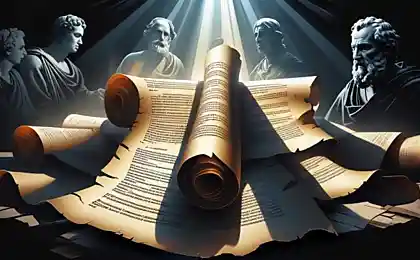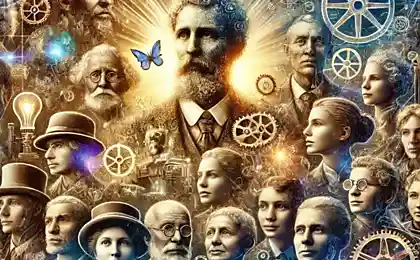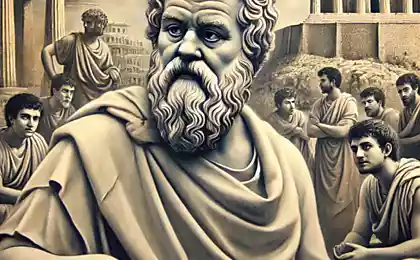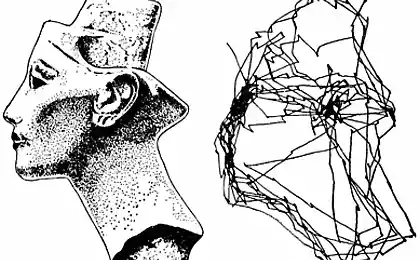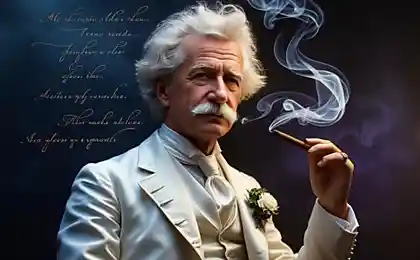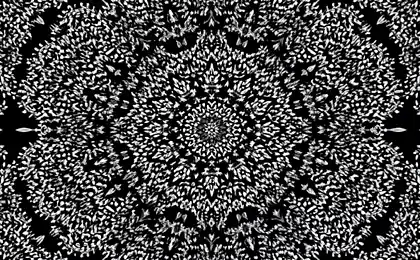503
10 philosophical concepts that should be familiar to everyone

© Norvz Austria
The theory of ideas of Plato
Plato was the first who separated the "world of things" from the "world of ideas". The idea (Eidos) according to Plato is the source of things, its type, underlying to a specific subject. Present in our minds, for example, the "idea table" may either coincide with a specific table in reality or not be the same, but the "idea table" and "specific table" will still continue to exist in the mind separately. A striking illustration of the division of the world into the ideological world and the world of the subject is the famous Plato's myth of the cave in which people do not see objects and other people, but only their shadows on the cave wall. A cave for Plato is the allegory of our world, where people live, believing that the shadows on the walls of caves — the only way of knowing reality. However, the shadow is only an illusion, but an illusion where the person is unable to refuse because of his failure to put a critical question about the existence of reality and to overcome their "false consciousness". Developing Plato's ideas, philosophers of a later time came to the concept of the transcendental and the "thing-in-itself".
Introspection
Introspection (from lat. introspecto — look inside) — the way of self-knowledge, in which man is watching his internal reaction to the events of the outside world. Introspection is a fundamental human need, allowing him to thoroughly examine himself, to explain himself, why he believes what he believes, and if there was any possibility that his faith is wrong. The founder of the method is considered British educator and philosopher John Locke, who, drawing on the ideas of rené Descartes, pointed out that there are only two direct sources of all knowledge: the objects of the external world and the mind of man. In this regard, all the important psychological facts of consciousness are open to study only the subject of cognition — it may well be that the "blue color" for one person is not the same as "blue" for another.
The method of introspection helps to track the stage of thinking, breaking the sense elements and providing a complete picture of the interrelationship of thoughts and actions. Introspection teaches us to think in more abstract and more widely, for example to perceive the "big red Apple" as "a feeling of red alternating with round impression, which occurs simultaneously with a slight tickle in the language, apparently, a trace of taste sensations". But don't get too deep into introspection — excessive focus on tracking their own experiences dulls the perception of reality.
Solipsism
Solipsism (from lat. solus — "only" and ipse — "himself") — a philosophical concept according to which man recognizes as the only existing and always available for his intervention reality only in his mind. "There is no God, no universe, no life, no humanity, no heaven, no hell. All just a dream, intricate a stupid dream. There is nothing but you. And you just thought, wandering thought, an aimless thought, a homeless thought, lost in the eternal space" — so formulates the main message of solipsism mark TWAIN in his story "the Mysterious stranger". The same idea, in General, illustrate the film "Mr. Nobody", "Start" and "the Matrix".
The rationale of solipsism — that person is available only to his perception of reality and his thoughts, while the external world is beyond credibility. The existence of things for man is always only a matter of faith, no more, as if someone will require evidence of their existence, people will not be able to provide them. In other words, no one can be sure of the existence of anything outside his consciousness. Solipsism is not so much doubt the existence of reality, but rather the recognition of the primacy of the role of his own mind. The concept of solipsism, or need to learn such what it is, either accept "solipsism, on the contrary," that is, to give a rational explanation of the relative outside world and to justify to himself why this outside world still exists.
Theodicy
If the world was created by some higher plan, why it is so full of absurdity and suffering? Most believers will sooner or later begin to ask that question. In desperate help comes theodicy (from the Greek. God, "God, deity" + Greek. δίκη, "justice") is a religious and philosophical concept, according to which God is unequivocally recognized as the absolute good, which removed any liability for the presence of evil in the world. This doctrine was established by Leibniz in order to conditionally "justify" God. The main issue of this concept: "why does God want to rid the world of misery?" The answers boiled down to four: either God wants to save the world from evil, but cannot, or can but does not want or is not willing, or can and wants. The first three options do not fit with the idea of God as the Absolute, while the latter option does not explain the existence of evil in the world.
The problem of theodicy arises in any monotheistic religion, where the responsibility for evil in the world theoretically would have to rest with God. In practice, however, attribution to God is not possible, since God is recognised religions a kind of Ideal, entitled to the presumption of innocence. One of the main ideas of theodicy is the idea that the world was created by God, a priori, there is the best of all possible worlds, and therefore it collected only the best, and the presence of evil in this world is seen only as a consequence of the need for ethical diversity. To accept the theodicy or not is a personal matter, but to explore that concept, definitely worth it.
Moral relativism
Life would be much simpler if good and evil were fixed, absolute concepts — but often we are faced with the fact that what is good in one situation may be evil in another. Becoming less dogmatic on what is good and what is bad, we are approaching moral relativism — the ethical principle that denies the dichotomous separation of the concepts "good" and "evil" and not recognizing the presence of mandatory standards and categories. Moral relativism, in contrast to moral absolutism, does not believe that there are absolute universal moral standards and principles. Not morality takes precedence over the situation, and the situation over morals, that is important, not just the fact of an action and its context.
The philosophical doctrine of "permissiveness" recognizes every individual's right to form their own values and their own ideas about the categories of good and evil and suggests that morality is, in essence, a relative concept. The question is, how conceive a particular person, armed with this concept, the famous motto of Raskolnikov, "I'm trembling creature or have the right?" also grew out of the idea of moral relativism.
To interpret this idea in different ways — "nothing sacred" to "do not blindly put life in a narrow frame". In any case, the range of issues posed by moral relativism, is a useful mental exercise and a good test of any belief.
The categorical imperative
The Golden rule of ethics — "do unto others as you would have them do to you" — sounds even more significant if the reference to Immanuel Kant: this provision is included in his concept of the categorical imperative. According to this ethical concept, one must act according to the Maxim, which, in his opinion, could become universal law. Within the framework of this concept, Kant suggests not to consider the other person as a means and to treat it as an end goal. Of course this approach does not exempt us from mistakes, but the decisions become much more fully realized, if you think that every time you choose not only for ourselves but for all mankind.
Determinism/indeterminism
Thinking about free will, fate and predestination, we are entering determinism (lat. determinare — define limit) philosophical doctrine of predestination, of the interrelatedness of events and the presence of all existing single reason. "Everything is predetermined. Everything will happen according to the given scheme" — this is the main postulate of determinism. Free will, according to this doctrine, does not exist, and in different interpretations of determinism fate of a person depends on various factors: either it is pre-determined by God, or significant philosophically conceptualize the category "nature".
Under the doctrine of determinism, no event is considered random, but are the consequence of pre-determined, but unknown to man a chain of events. Determinism excludes the belief in free will, in which the responsibility for actions falls on the person and causes the person to completely entrust their fate of causality, the laws and sovereignty of the outside world. Convenient, in General, the concept is for those who do not want to take responsibility for their own lives. And for those who in the framework of determinism too closely, it is worth examining the arguments of the opposite concept of indeterminacy.
Cogito ergo sum
"I think, therefore I exist" is a philosophical concept of the rationalist rené Descartes and good support for the doubters in everything. This formula originated in attempts to find the primary, indisputable and absolute truth on which you can build a philosophical concept of absolute knowledge. Descartes questioned everything: the external world, their feelings, God, public opinion. The only thing that failed to question is own existence as itself a process of doubts about his own existence was proof of that existence. Hence the formula "I doubt, therefore, think; I think, therefore I exist" transformed in "I think, therefore I exist" — this phrase became the metaphysical basis of modern philosophy. It proclaimed the dominant position of the Subject around which it was possible to build reliable knowledge.
The death of God by Nietzsche
"God is dead! God will not be resurrected! And we killed him! How comforted we, murderers of the murderers! The most sacred and powerful Being, only what was in the world, bled to death under our knives — who will cleanse us with the blood?". The thesis "God is dead" Nietzsche proclaimed, implying not the death of God literally — he meant that in a traditional society the existence of God was a fact, he was in one reality with people, but in the modern era it has ceased to be a part of the external reality, becoming more of an internal idea. This caused a crisis of the system of values, which previously was based on the Christian worldview. So, the time has come to review this system — in fact, doing philosophy and culture of postmodernism.
Existential crisis
The existential crisis was the result of the above-described collapse of the traditional system of values — it stems from the idea that human existence has no predetermined purpose or objective sense. This is contrary to our deepest need to believe that human life has value. But the lack of original meaning is not lost meaning at all — according to the concept of existentialism, the value of life is manifested in how a person carries himself, made his election and committed actions. published
P. S. And remember, just changing your cjpyfybt — together we change the world! ©
Source: theoryandpractice.ru/posts/8209-philosolophy-must-knows
Golden rules: How to care for your liver
Interpretation of gestures and gait: learn about your friends more


